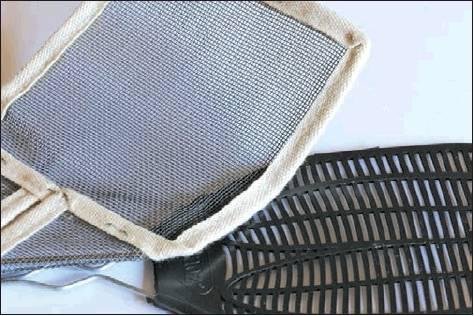Grandma’s weapon of choice
Down South Down South
In the heydays of Sunday drives, you’d be hard pressed to find air-conditioned stores and homes in rural areas.
Oh, you might see a window unit …
This item is available in full to subscribers.
Subscribe to continue reading. Already a subscriber? Sign in
Get 50% of all subscriptions for a limited time. Subscribe today.
Please log in to continueNeed an account?
|
Grandma’s weapon of choice
Down South Down South
In the heydays of Sunday drives, you’d be hard pressed to find air-conditioned stores and homes in rural areas.
Oh, you might see a window unit or two, but central air was rare. Breezes blew back window curtains and whirled through screen doors on sultry summer days.
Inevitably, flies found their way insides and made themselves at home in the kitchen. It was there, at the hands of my grandmothers, that they met their maker.
Remember honest-to-goodness fly swatters made of screen-wire? My grandmothers wielded those instruments of doom with an Olympic fencer’s skill. Many times I watched those ladies pull off a trifecta: dispatching 3 flies with one swat.
My grandmothers didn’t need bug sprays. Nor did they have new-fangled bug zappers. No, they walked around with a screen-wire fly swatter in hand.
While talking to me their eyes would dart about and a smooth backhanded “swat” sent Mr. Fly to the that great compost pile in the sky. Those ladies had fighter pilot reflexes. They even clobbered flies buzzing in the air.
My grandmothers relied on the real deal. They would have disputed the New Oxford American Dictionary’s definition of “fly swatter” as “an implement used for swatting insects, typically a square of plastic mesh attached to a wire handle.”
Plastic mesh? Please. Screen-wire swatters struck with deadly force and were far more effective than today’s plastic swatters, which flies evade with ease.
You see, the little critters detect changes in air pressure and a clunky plastic swatter says, “Here I come” as its thick plastic air-mashing mesh tips Mr. Fly off.
A thin mesh of screen-wire, however, arrives swiftly and silently with no shock wave, converting the fly to a countertop’s version of road kill.
Screen-wire swatters swat plastic swatters, (say that seven times), but you will be hard pressed to find a genuine screen-wire swatter today. All you’ll find are plastic ones.
Go online, however, and you can find honest-to-goodness screen-wire flyswatters. I suggest you get a few. Someday you will need them.
No visit to my grandmothers’ home was complete without watching those Southern ladies reach for an old-fashioned flyswatter. Both had radar. A flick of the wrist and a bloody stain marked the spot of the fly’s demise. But now we have plastic swatters not worth a hoot. Flies live to drop specks yet again.
Know what else was good about screen-wire flyswatters? The vanquished fly stuck to the screen where a shake over a toilet bowl buried the critter at sea.
When a plastic swatter scores a kill over a slow, dimwitted fly, the departed remains where right it was, albeit wider, thinner, bloodier, and best of all, dead. But now you have to scrape up the mess.
Flies and kids make a bad combination. Kids have an annoying habit of standing in an open door, neither going in nor out.
This will sound familiar to you baby boomers: “Close the door, you’re letting flies in.” Let ’em in we did and when the flies flew inside, my grandmothers were armed and ready. The war commenced.
The days of smashing flies are behind us. Air conditioning made life more tolerable, but it robbed us of color, character, and conflict. The war against flies required screen-wire swatters and cotton puffs stuffed in window screen holes.
Despite such patchwork measures, pesky flies managed to invade the house. It was there that they encountered the original No Fly Zone. If we kids got out of line, well, the swatter was good medicine for us, too.
Other items that may interest you







Comments
No comments on this item Please log in to comment by clicking here